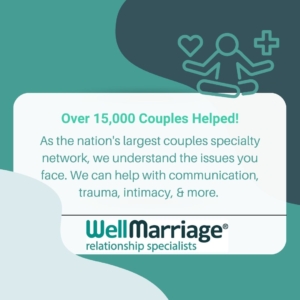The idea of marriage or couples counseling can be scary, especially when you don’t know what to expect. Hopefully, we can help calm your nerves. First and foremost, it’s important to point out that you’re not alone! One study found that 49% of married couples have invested time into counseling at some point in their marriage.
But does counseling help with relationship communication, specifically? Yes, it absolutely does– communication touches every area of a relationship, as the verbal and nonverbal exchanges between people are what build the relationship in the first place. We’re going to explore: what counseling actually means, couples therapy communication, and exercises and questions you might expect during your time in counseling.
What Happens in Couples Counseling?
Couples counseling, often known as couples therapy or marriage counseling, is a form of therapy that helps couples tackle problems in their relationship and improve their communication and intimacy. Marriage counseling procedures differ based on the therapist’s approach(es) and the couple’s individual needs and goals, but typically will consist of:
- Initial introduction and consultation
- Assessment and identification of issues
- Developing skills and solving problems
Most often, a licensed therapist will begin with an introduction and evaluation. In this evaluation, they ask you about your relationship history, any current concerns you’re facing, and goals you have for treatment. Together with your partner and the therapist, you should expect to investigate the problems that are causing conflict or frustration in your marriage.
All therapeutic centers will have variations of this general approach. At Well Marriage, for example, our first session will include an overview of your relationship’s strengths before diving into the more difficult topics. By the end of the first session, however, your counselor will provide insight into what is happening in the relationship and tools to immediately start calming down (or spicing up!) things at home. By four sessions, you should have not only useful insight, but also tools and strategies in place to begin fixing deeper issues.
How Does Therapy Help with Communication Skills?
Marriage counseling, or couples therapy, can serve as a great resource for couples who are dealing with communication challenges. Counseling can significantly improve communication skills by:
- Creating a Safe Space: Marriage counseling provides a secure and impartial setting in which you and your partner may communicate your thoughts and problems. Within the safe space, you can communicate without fear of being judged or retaliated against. This environment, managed by a skilled interpersonal clinician, promotes open and honest discussions, which can be challenging in other spaces.
- Identifying Communication Patterns: You and your partner can get help from a therapist by learning your habits and communication styles. You might not be conscious of how your way of communication contributes to misunderstandings, conflicts, or hurt feelings. With the help of a therapist, you and your partner may identify and change these patterns, where they come from, and work out techniques to grow together.
- Developing Active Listening Skills: You and your partner can learn active listening techniques from marriage counselors, including paying attention to what the other person is saying and validating their feelings. This makes it easier for you to communicate and makes your partner feel heard and understood.
- Improving Nonverbal Communication: Nonverbal communication with your spouse, such as your body language and voice tone, can be improved with the assistance of a counselor. They could give you tips for communicating how to communicate more effectively and pick up on your partner’s nonverbal signs.
- Encouraging Empathy and Understanding: Marriage counselors may support you and your partner to cultivate mutual understanding and empathy. This can improve your ability to communicate, minimize disagreements, and reinforce your emotional connection.
The good news is you can develop your communication skills with the help of a licensed counselor. And those skills lead to a happier and more fulfilling marriage. With counseling, you and your partner may be able to improve your communication skills and tackle issues in a more constructive way. Sounds good, right? If you and your partner are ready to figure out how to communicate better, consider contacting Well Marriage Center for help.
How Do You Improve Communication Between Couples?
You probably have heard that “communication is key” in relationships. And while it is important, communication is just one piece of the puzzle regarding marriage counseling. But how do you make your communication better? Couples can improve their communication over time and with effort, but the following marriage counseling tips are helpful:
- Focus on what your spouse says while actively listening to them without interjecting or passing judgment. Reflect on what they are saying and, if necessary, seek clarification.
- To avoid blaming your spouse, use “I” statements instead of “you” statements. When using “I” statements, you may say, for instance, “I feel worthless when you don’t listen to me” rather than “You never listen to me.”
- Even if you don’t agree with your partner’s viewpoint or beliefs, respect them regardless. Attempt to understand their perspective and the reasons behind their emotional responses.
- Consider the situation from your partner’s perspective and think about how they might feel when issues arise. Even if you disagree with their behavior and response to the situation, express empathy for their emotions.
- Recognize your partner’s communication style and tone. When we have different ways of communicating the same thing without understanding, we can often end up in toxic cycles. An example of this is when one partner shuts down and the other keeps trying harder and “chasing.” This pursue-withdraw cycle can often be fixed with the help of a therapist.
- Take accountability for your actions and don’t accuse or blame your partner for the problems you might have caused or contributed to. Owning up to any mistakes or poor reactions can help mend your communication and strengthen your relationship.
Improving communication between couples requires effort and patience, but with the right help and guidance, you’ll find you can grow as a couple and strengthen your relationship. But marriage counseling can help with more than communication—and believe it or not, communication isn’t always the most pressing issue.
What Can Couples Counseling Help With?
Counseling can help address many issues within a marriage or relationship, including:
- Trust
- Conflict resolution
- Different values or goals
- Intimacy & sex
- Money concerns
- Communication
- Family dynamics
- Life changes
- Forgiveness
When one spouse feels hurt or betrayed by the other—through actions like cheating, lying, or broken promises—one of you might develop trust concerns. This might even lead to living separately during marriage counseling. In other cases, partners can disagree on important decisions because they have different priorities, values, or personal goals, which can strain the relationship. Other issues like intimacy can lead to feelings of dissatisfaction or disconnection. No matter what it boils down to, you might be struggling to resolve arguments in a healthy and productive way, which can result in continuous tension and frustration.
In these cases, being open and honest during your sessions about what is impacting your relationship, even if it is a difficult topic, is an essential step to resolving any problems you might be facing. It’s important to remember that these problems can be complicated and it’s not unusual for couples to experience multiple challenges at once.
One essential piece of counseling for marriage problems is developing new ways to approach your relationship. To help couples communicate their needs and feelings more effectively, a counselor will introduce new skills and strategies during the sessions. At Well Marriage Center, we focus on strengths-based counseling where you and your partner can focus on building strong relationships to construct a solid foundation on which your marriage, or relationship, can grow.
How Can Marriage Counseling Help a Couple Improve Their Relationship?
Marriage counseling and couples therapy take commitment from both partners to be successful, so you should not consider it a “quick fix” for marital issues. However, statistics show that counseling does help couples improve, strengthen, and renew relationships. The American Association for Marriage and Family Therapy notes that over 75% of couples report improving their relationship after completing counseling. So how can marriage counseling help your relationship?
- Resolving and managing conflict on important issues
- Rebuilding trust and healthy patterns after an event such as infidelity and lying
- Improving intimacy to connect physically and emotionally
- Establishing open, honest, and respectful communication in a safe space
- Understanding your partner, their needs, and their perspective
- Learning new skills to face current and future challenges
- Addressing and working through past trauma and habits
- Understanding emotional development, prior attachments, and coping mechanisms
- Learning how to build new, healthier neural pathways over time
To start, it’s crucial to build on your relationship’s strengths to lay down the groundwork. After establishing that foundation, you and your partner should discuss your differences and identify areas of agreement. This can help couples resolve challenges and cultivate a more supportive and productive connection. Because a therapist is there for guidance and support, you don’t have to take these problems head-on. Instead, you can repair and rebuild your relationship with the help of an unbiased party.
With specialized counselors like ours at Well Marriage Center, you can find success in couples therapy exercises that positively reinforce what you’ve learned during your sessions. Using our strengths-based approach, Well Marriage is dedicated to keeping couples together and avoiding separation whenever possible.
What Do You Discuss in Marriage Counseling?
Marriage counseling is about addressing the problems you’re facing in your relationship. To do this, you’ll have to talk about some pretty difficult subjects—and that’s okay! To help you prepare for these hard discussions, here are some common questions marriage counselors ask:
Let’s Get to Know Each Other
During your intake meeting, your therapist will often begin with questions about you, your partner, and your relationship with one another. Some topics you should expect to discuss include your relationship history and how you got to where you are today.
- How did you meet each other?
- What attracted you to one another?
- What do you respect about each other?
- How was your relationship before marriage? (Or in the beginning, for those not married.)
- What are your expectations for counseling?
- What challenges would you like to address?
It’s Time to Dive Deeper
Once your therapist gets to know you better as a couple, they will start asking more in-depth questions regarding your relationship.
- How do you communicate with each other?
- What are some of your shared values and beliefs?
- How do you spend time together?
- How do you handle conflict and disagreements?
- How do you express love and affection?
- How do you handle stress and difficult situations as a couple?
Tackle the Problems Head-On
Now come the nitty-gritty questions that might be hard to answer, but will ultimately lead to better results in communication and other relationship skills. To help the couple identify underlying problems, explore delicate subjects, and challenge harmful habits in their relationship, therapists may pose some challenging questions.
- Do you feel like you can be vulnerable and open with your partner?
- Are you both committed to making this relationship work?
- What specific behaviors or actions have hurt your partner in the past?
- Do you feel that your partner truly understands you and your needs?
- How have past traumas or experiences impacted your relationship?
- Do you feel that you are both putting in equal effort to maintain the relationship?
We’ve Finished Treatment, What’s Next?
To help you reflect on your development and gauge the effectiveness of counseling, a therapist may pose several questions at the conclusion of treatment.
- How do you feel about the progress you have made during counseling?
- What specific skills or strategies have you learned?
- Are there any unresolved issues or concerns that you still need to work on as a couple?
- How have your communication and conflict resolution skills improved?
- Do you feel that you have gained the tools and resources needed to maintain a healthy relationship?
- Have you noticed any changes in how you relate to each other outside of the counseling sessions?
This is by no means a comprehensive list of all of the questions you will explore with a marriage counselor, but they provide a snapshot of what you can expect from therapy. With a licensed counselor, you’ll be able to dive into the root causes of your relationship problems, and answering questions openly and honestly is essential to finding success. With Well Marriage’s approach, you can strengthen your relationship and find a deeper connection with your partner. It all starts with a 90-minute initial session and a structured relationship strengths and wellness evaluation.
Questions to Ask During Marriage Counseling
When it comes to marriage counseling questions to strengthen your relationship, you should consider what your goals are for counseling and, ultimately, your marriage. It’s important to keep in mind that you’re working together to find a solution that works best for both of you. However, it’s hard to get to that point without understanding your partner’s perspective or explaining your own. So what should you ask your partner during counseling sessions? Remember that learning valuable communication skills is an important part of marriage counseling, so your questions should reflect your goal of listening to your partner and learning their needs.
- How do you feel about our relationship as it is? Do you have any expectations?
- What are your most important needs in our relationship?
- How do you feel when we argue or disagree?
- What are the most significant sources of conflict in our relationship?
- How can I help support you and meet your needs?
Understanding each other’s perspectives is essential to strengthening your relationship. When you ask questions, be sure to ask both pointed questions about your partner and how they feel, as well as questions you can both answer, like “How can we improve our communication with one another?”
This allows you both to speak your mind and determine what would be best for both of you. Some may worry that a couples therapist is biased. Couples therapists will often spend a session with each partner as individuals to get a stronger sense of the situation, but if you find yourself in a session with a counselor that chooses sides, you should reconsider if that environment is best for you and your partner to strengthen your relationship. A professional counselor like ours here at Well Marriage want to help you renew your relationship and grow stronger together, not pick sides.
Strengthen Your Relationship with Well Marriage Center
With the help of counselors like ours at Well Marriage, you’ll work with a licensed counselor that takes a strengths-based approach to counseling. More than 15,000 couples have benefited from our counseling so far in improving their relationships, healing from past hurts, and finding new intimacy. We provide a clinically supported, scientific approach to repair your relationship and strengthen your future commitment through in-person, virtual, or hybrid sessions. We are the largest Couples Specialty Center in the US for good reason!. If you’d like to learn more about our services or set up an appointment, please reach out to our Intake Coordinator, Melinda, using our intake form.


